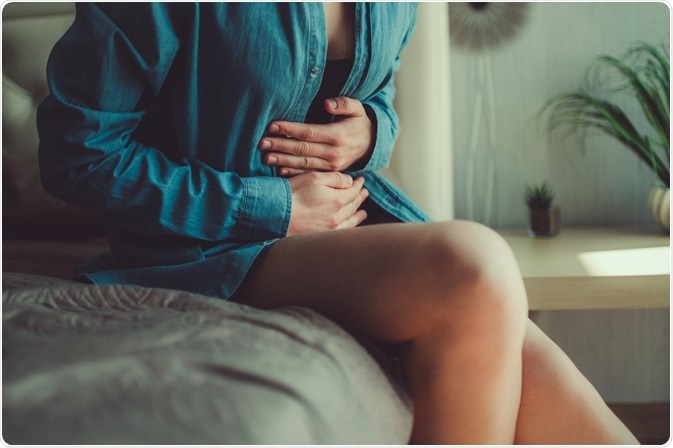The cause of interstitial cystitis remains unknown, despite the proposal of several theories that may explain the pathophysiology of the condition. Contrary to other types of cystitis, there does not appear to be an infection of the bladder and antibiotics do not offer a benefit to patients.
Inflammation that is associated with the bladder is thought to cause the symptoms, although medical experts do not agree upon the origin of this. Ulceration, scarring and stiffness of the bladder may play a role as causative factors of the inflammation.
There are several theories proposed by medical researchers that explain the possible causes of the condition, which are described in more detail below.

Image Credit: goffkein.pro / Shutterstock
Bladder Lining Theory
Damage to the bladder lining or epithelium may lead to inflammation and irritation of the bladder, resulting in the painful symptoms observed in patients with interstitial cystitis.
This could potentially lead to the leakage of urine from the bladder into the surrounding muscles and nerves. As a result, the pain and other symptoms may affect the entire abdominal area in close proximity to the bladder.
Possible situations that may affect the bladder lining and cause the condition include:
- Trauma to the bladder or spinal cord
- Over distention of the bladder (e.g. after infrequent bathroom breaks)
- Hypersensitivity of the pelvic nerves
- Abnormality of mast cells
Pelvic Floor Theory
The pelvic floor muscles play an important role in the control of the bladder and urination process. It has been proposed that a problem with the pelvic floor muscles may lead to inflammation of the bladder and act as a cause of interstitial cystitis.
This may result from a dysfunction of the pelvic floor muscles or weakening of the muscle over time for varying reasons.
Genetic Theory
Although a genetic link is unlikely to be the sole cause of interstitial cystitis, it may be possible for individuals to inherit a predisposition to the condition.
Some cases have been reported of blood relatives being affected, including cases of a mother and daughter, and sisters being affected. However, to date, no specific gene has been linked to an increased risk of the condition.
Nerve Damage Theory
In some patients, there may be damage to the nerves that are responsible for carrying sensory messages from the bladder. This has the potential to cause the pain associated with normal physiological events, such as the filling of the bladder.
Autoimmune Theory
An autoimmune response involving the destruction of the cells in the bladder has also been proposed as a cause of the condition. It is more common for individuals with an autoimmune disorder to suffer from interstitial cystitis, which suggests autoimmunity may be involved in the pathophysiology.
This theory is linked to several other related health conditions that may play a role in the cause.
Associated Conditions
Interstitial cystitis has been linked to several other conditions, due to the high frequency of patients that present concurrently with other symptoms and conditions. These include:
- Atopic allergy
- Chronic fatigue syndrome (CFS)
- Fibromyalgia
- Inflammatory bowel disease (IBD)
- Irritable bowel syndrome (IBS)
- Scleroderma
- Sjogren syndrome
- Systemic lupus erythematosus
This suggests that interstitial cystitis may be a component of a more complex syndrome, involving a broad number of factors and organ systems.
Continuing Research
Medical researchers continue to investigate the pathophysiology of interstitial cystitis, as successful treatment options will become clearer when more is known about the cause of the condition. In the future, it is hoped that targeted treatments could help to address the specific cause of the condition.
References
Last Updated: Apr 14, 2021